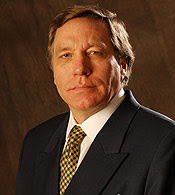How often have we seen Christian ministries and ministry leaders fall in the recent past? In 'The Longview: Lasting Strategies for Rising Leaders ,' author Roger Parrott, PhD attributes part of the reason to the decisions that these ministry leaders make. They choose easy solutions over principled, long-term strategies. The results can be devastating, as ignored issues become full-blown crises, and small problems become large challenges.
,' author Roger Parrott, PhD attributes part of the reason to the decisions that these ministry leaders make. They choose easy solutions over principled, long-term strategies. The results can be devastating, as ignored issues become full-blown crises, and small problems become large challenges.
Dr. Parrott is currently the president of Bellhaven University, a Christian liberal arts university in Jackson, Mississippi. He has a PhD in higher education from the University of Maryland. He also serves in leadership roles for the Lausanne Committee for World Evangelism, Mission America Coalition, and Council for Christian Colleges & Universities. On a personal note, he is the older brother of Dr. Les Parrott, who ministers with his wife, Dr. Leslie Parrott, on marriage and relationship issues.
Dr. Parrott explains the difference between longview and short-view ministry:
We live in a quick-fix, immediate-impact, short-view world.
But we serve a longview God.
To bridge this gulf between earthly priorities and a heavenly perspective, Jesus became the ultimate example of longview leadership amid the clamor for expedient results. Of course His sights were always aimed toward eternity (the ultimate longview), and He lived and thought in that realm. But even in the practical of everyday demands of leadership, Jesus showed us the value of investing in longview solutions as we serve those in our care. (p. 9)
Dr. Parrott has this insight about the Me Theology that pervades the church:
Too much ego has wormed its way into the church through a “me-focused” theology that creates sanctified excuses for self-centeredness and ego. Serving God is not about what is in it for me. It is not about asking Jesus for a shopping list of things that will diminish my troubles. And, more importantly, it is not about being lifted up in the eyes of others. Loving and serving God is about glorifying Him. Faithful living is about honoring Christ in what we do. And being a Christian is about living in a way that makes sure our Lord is the center of attention and praise. (p. 34)
Dr. Parrott points out characteristics of the Showman (pp. 35-39):
· Live Flamboyantly
· Inflate Vision
· Act Invincible
· Ignore Critics
· Crave Adrenaline
· Exaggerate Actions
· Become Sensitive
· Attract Groupies
· Demand Appreciation
· Require Empathy
· Listen Poorly
· Enjoy Competition
· Control Obsessively
· Ignore Boundaries
Humility in leaders is invaluable. Dr. Parrott uses Jesus as an example:
Jesus was the most humble person to ever walk this earth. He was God in the body of a human, and He could have done anything He wanted to do – possessing the power to make anything happen. But He limited Himself to only what His Heavenly Father asked Him to do. And so through His humility, Jesus was able to spend ordinary days with His disciples and reveal the natures of God to them through a deep mentoring relationship. (p. 68)
Dr. Parrott makes the interesting assertion that Christian ministries should not plan; Chapter 8 is entitled ‘Planning Will Drain the Life from Your Ministry.’ Here are his thoughts on this:
To start where we are and determine what we can do to move our current situation to a new level is a limiting way to look at God’s calling in our lives. Rather, if we will prayerfully, carefully, and regularly seek the Lord’s will for our ministry, we can glimpse a picture of His desires, and then work backward from that outcome to determine how to get there. (p. 151)
I think my favorite part of the book is Chapter 13 – ‘Catching the Wind of God.’ He begins the chapter this way:
I am convinced one of the core problems of evangelical leaders is that too often we’ve stopped trying to catch the wind of God n our sails because we’ve become fairly effective at creating our own independent power to get God’s work done. We can deploy plans, strategies, and best practices, but at the end of the day, we require a determined godly focus to make it far into the future with those we lead. And even though our motors can propel us forward to do many good things in ministry, we will miss catching the wind of God when our motors are revved rather than our sails mended. (p. 237)
I used to attend a large church in which the leader seemed to be running a power boat as opposed to catching the wind of God in a sailboat (he went so far as to ride his Harley out on stage for one weekend service). We left the church because of some of the things we saw behind the scenes, and were alarmed by how the church seemed to be man-made instead of relying – and waiting – on God; we didn’t want to sit under that type of leadership. I pray that they are not still on that path. This book is well-suited for leaders like that; they only need to stop and accept that Godly counsel by reading this book.
I thank Dr. Parrott for writing such a practical book, which is useful for both university presidents and lay leaders. I personally learned a lot from his insights. This is a book that will be referenced by me over and over again.
You can order this book here .
.
This book was published by David C. Cook and provided by the B&B Media Group for review purposes.




























.jpg)







No comments:
Post a Comment